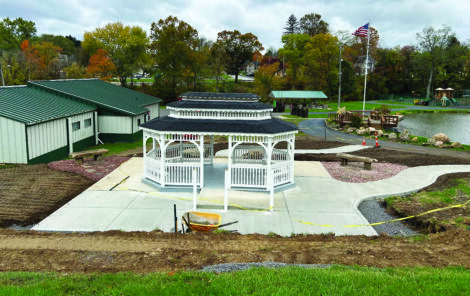Virtual summit scrutinizes derailment response
EAST PALESTINE — The son of the late U.S. Sen. Robert F. Kennedy and 2024 presidential candidate Robert F. Kennedy Jr. weighed in on the Norfolk Southern train derailment during the Common Sense Summit streamed by River Valley Organizing (RVO) on Sunday. The summit was moderated by United for East Palestine co-founder Alex Felix.
The group is not based in East Palestine and should not be confused with the community advocacy Unity Panel for the East Palestine Train Derailment.
Kennedy, an environmental attorney and founder of the nonprofit environmental group Waterkeeper Alliance, joined East Palestine resident Zsuzsa Gyenes, Purdue University professor Andrew Whelton as well as representatives of Railroad Workers United, Toxic Free Future and Cancer Free Economy for a virtual discussion.
Kennedy has partnered with the law firm Morgan & Morgan and currently represents several families in the East Palestine area. He likened the environmental impacts in the wake of the derailment to theft.
“Pollution has always been wrong and it’s always been recognized as morally wrong and it’s an act of theft,” Kennedy said. “Pollution has always been an act of theft and it’s always been illegal.”
Kennedy said that the protection of the environment and common lands can be traced back to ancient laws and medieval England and the Magna Carta. He said fundamental principles followed Europeans across the Atlantic and remained the standard until the Industrial Revolution, when legislators with both good and bad intentions weakened or eliminated environmental protections. According to Kennedy, industries were able to operate without restrictions until the 1960s when the ramification of legal pollution killed the aquatic life in the Great Lakes, caught the Cuyahoga River on fire and shut down oceanside communities in California.
Kennedy is confident that economic prosperity and environmental protection can co-exist.
“The television gas bags that are taking money from the big polluters will tell you to choose between economic prosperity on one hand and environmental protection on the other and that’s a false choice,” he said. “In 100 percent of these situations, good environmental policy is identical to good economic policy.”
Mark Burrows of Railroad Workers United insists the technology exists for railroads to be greener and more independent of diesel. He said that railroads are “the greenest and most environmentally friendly mode of transport when operated safely,” but said profits get in the way.
“The East Palestine tragedy has become the latest poster child for what can happen when a perfect storm of negative factors come together,” Burrows said “A perfect storm of several factors came together in East Palestine and most, if not all, of these factors flow from the relentless profit drive of the railroad.”
Burrows cited “speedup with less people” as the main problem. He said if railroad freight-car inspectors were allotted more time to complete their tasks, derailments like the one in East Palestine would be avoided.
“The speedup most likely missed the defective bearing that ended up causing the derailment,” he said.
Burrows also questioned why the train passed through three hot box detectors while on fire and stopped only when a third one was tripped and advocated for the installation and use of electro-pneumatic (a type of air brake that allows for immediate application of brakes throughout the train instead of the sequential application) on all American freight trains.
“This train was 1.8 miles long and 18,000 tons. If it had electro pneumatic brakes, which the industry has fought for 20 years, the pileup wouldn’t have been nearly as severe,” Burrow said. “The scope of derailment could have been minimized if it had electro pneumatic brakes.”
According to Burrows, another element to the “perfect storm” was crew fatigue.
“A big factor is the relentless schedule and this came up in the contract last year,” Burrows said. “Most crews are working 24 hours, seven days a week, going to work on two-hours notice without scheduled time off.”
Burrows is advocating for nationalization of the railway and putting rail transport assets into public ownership and out of the hands of for-profit companies.
While Burrows took the railroads to task, Mike Schade of Toxic Free Future called out the plastic industry.
“Sadly, the East Palestine train derailment was not an isolated incident. In fact, the plastic industry has a long history of frontline communities for decades,” Shade said. “The production of vinyl chloride is predominantly used to make PVC plastic. It’s a very common plastic but unfortunately from production to use to disposal, PVC is an environmental nightmare. There’s no safe disposal; when PVC plastic is landfilled and incinerated it can release dangerous chemicals like dioxins as we saw in the train derailment in Ohio a couple months ago.”
Occidental Chemical and Sintech both had three train cars that derailed and burned in the derailment. Occidental also had a tank car compromised in the Paulsboro, New Jersey derailment. According to Schade, air monitoring indicated a large amount of vinyl chloride in the environment following that derailment. Schade also said Occidental Chemical released 59,679 pounds of vinyl chloride in the air in 2021 by their own self reporting while Shintech reported 45,250 released.
“There are 19 PVC and vinyl chloride plants in the United States and together they produce between 10 and 20 billion of vinyl chloride on an annual basis. Plants also reported releasing more than 400,000 pounds of vinyl chloride into the air according to recent data that is available to the U.S. EPA,” Schade said. “So while the train derailment in Ohio was terrible and a massive environmental tragedy, one of the worst environmental tragedies in recent decades, our report reveals that other communities day in and day out are being exposed to the very same chemicals.”
Gyenes, 31-year-old East Palestine mother displaced since the disaster, says she knows first-hand the strains and stress of chemical exposure. Over 100 days later, Gyenes still doesn’t know what will become of her house which she says still reeks of chemicals and she doesn’t know what long-term health impacts will be on her family, especially herself and her son who are both immune compromised. That worry, she said, keeps her up at night.
“We’ve had very little to no communication from basically every level of government and Norfolk Southern,” she said. “Norfolk and government agencies ignore us and gaslight our worries and sicknesses. It’s truly dehumanizing. I feel like we are screaming into the void. I feel abandoned. These chemicals are forever. They build up in our bodies and wreak havoc on our health even for generations. I don’t know if my son is going to be able to have children one day and I don’t know if I will be around to meet them.”
Whelton, a Purdue University professor of civil, environmental, and ecological engineering, said the impact that the lack of information has on residents like Gyenes is the biggest lesson to be learned from the derailment. Whelton’s team investigates disasters that affect natural and built environments and his expertise focuses on environmental chemistry and engineering, disasters, polymer science and engineering, water quality, infrastructure and public health.
“Something we really need to push is connecting communities with their elected officials and demanding transparency and action,” Shelton said. “Ultimately, there is no law that requires testing for certain things after a disaster. There are laws that require the formation of different organizations and government agencies but ultimately it’s the decision of each agency about what to test for, what not to test for, where to and where not to test. This is where transparency and answers are needed.”
Gyenes said while questions are abundant, answers are scarce.
“Norfolk and government agencies downplay the situation. They consider our lives the cost of doing business,” Gyenes said. “We just want straight answers. We want testing. We don’t know where to go. Three months later, the map of the plume cloud still hasn’t been officially released. We don’t know where to go that’s not affected without truly uprooting our lives. We want politicians who won’t sell out our lives. We want negligent corporations to be held accountable.”
Debra Edenberg, the strategic director for the Cancer Free Economy Network, agreed and advocated for stronger federal legislation and right-to-know laws that educate local governments on potential risks. She also said those officials must be transparent and companies held accountable when environmental disasters occur. She also insisted that data and results be provided to the public in a way that is clearer and with words that people understand.
“We’ve been playing Russian roulette with dangerous chemicals even though we don’t truly know what to do when the worst-case scenario predictably plays out again and again,” Edenberg said. “Our response to the East Palestine train derailment and to similar events happening across the country, must prioritize people’s health over health over profits.”
Kennedy said when considering the big picture those profits are nothing more than fool’s gold.
“If we do what the polluters want us to do and treat the planet like East Palestine and Columbiana County as if they were business liquidation and convert our natural resources to cash as quickly as possible, we will have a few years of pollution prosperity,” he said. “We can generate the cash flow and the illusion of a prosperous economy and we can make a few people rich, filthy rich in some cases, but our children are going to pay for our joyride. They are going to pay for it with diluted landscapes, poor health and huge clean-up costs that are going to amplify over time. Environmental injury is deficit spending. It’s a way of loading the costs of our generation’s property onto the backs of our children.”
selverd@mojonews.com


